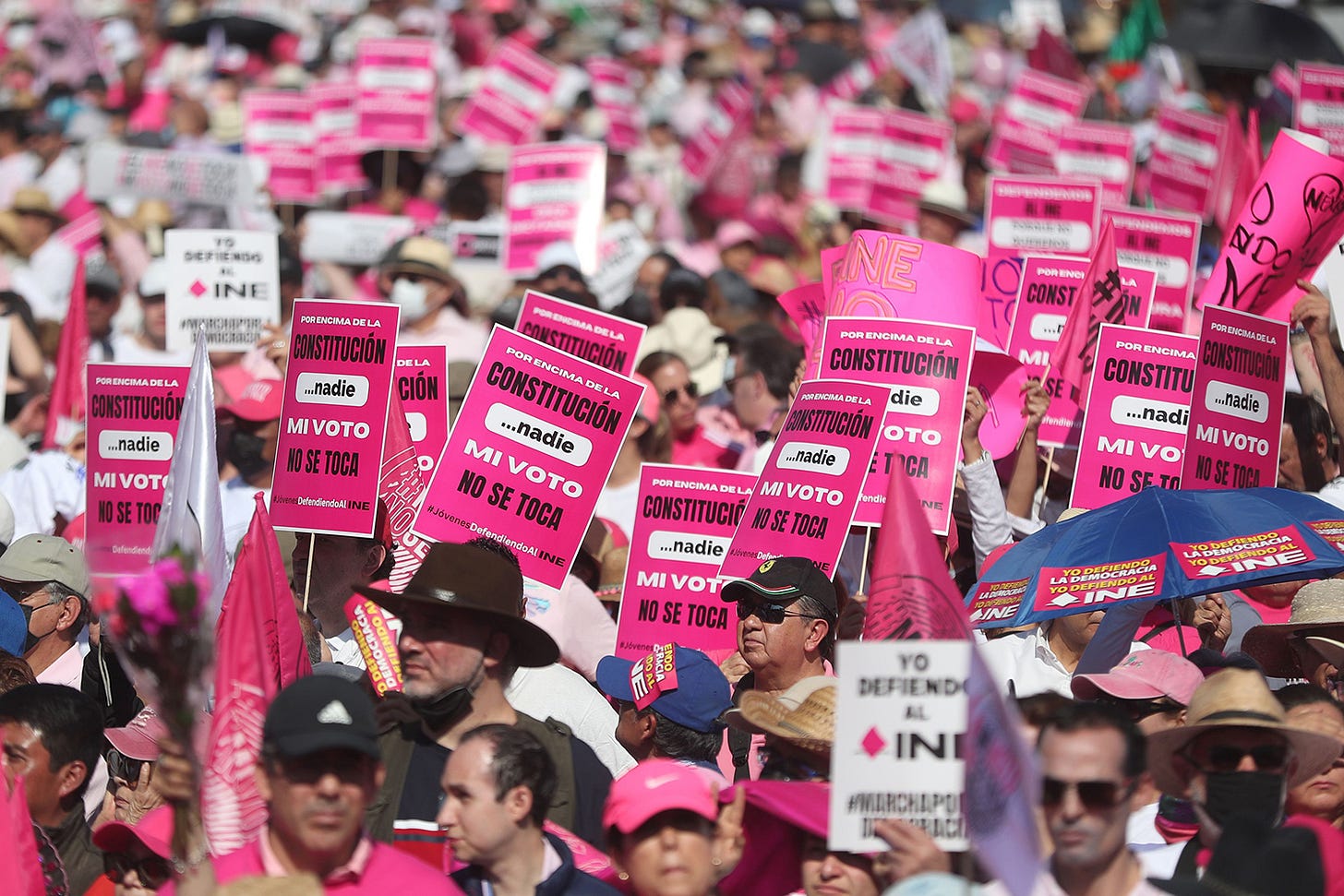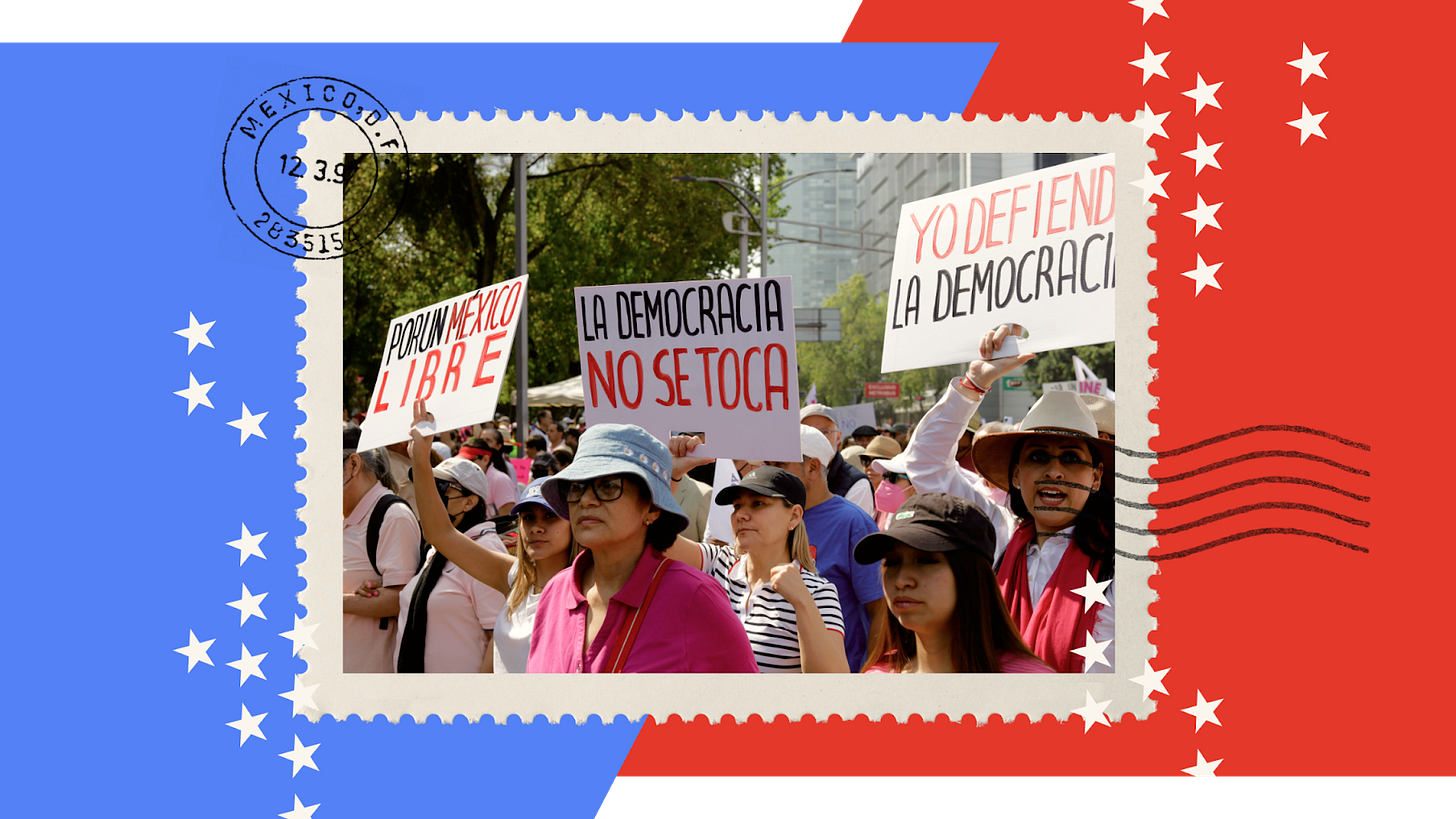Democracy Atlas rule 3: Win lawsuits and hearts and minds
Mexico’s experience shows the importance of balancing law and politics
Rule 3: Win lawsuits *and* hearts and minds: Courts can stop some authoritarian actions, but they can’t win elections. Balance litigation efforts with appeals to both the pro-democracy base and persuadable voters. It can be tempting when facing an enormous threat to speak to lofty ideals and technical goals, but that alone will not serve you well. Nor will simply “opposing” the powers that be. It is imperative to offer a positive alternative vision to both the autocrat and the rejected status quo that got them into office to begin with.
Remember that at the heart of democracy, it is the people, not processes, that you are fighting for. Be explicit about how your tactics will address the needs of those who are suffering, and explain why authoritarianism will (ultimately) cause them greater harm. Offer a genuine way out that also leads to a brighter future.
In terms of elections, if you fail to win the hearts and minds of the people, the government may not need to manipulate the results or the process in order to lock in power for decades. They will simply manipulate the playing field of politics, or — not seeing a plausible alternative — the people will give in to apathy and inertia. Keep the movement engaged, and keep the focus on the concrete economic and social injuries felt by many. Get back on your feet after a loss and do what is best for the people and their future — not just the pro-democracy party.
Beginning in 2018, Mexico’s democracy steadily declined as then-President Andrés Manuel López Obrador (commonly referred to as AMLO) and his personalist National Regeneration Movement (Morena) party pursued various power grabs to advance their populist policy agenda.
Mexico is not alone. The rise of populist leaders — on both the left and right — continues to vex those hoping to reverse years of global democratic backsliding. Many of today’s elected autocrats first came to power on populist platforms, framing politics as an existential battle between “us versus them.” And while populism on its own isn’t always a driver of democratic breakdown, its trappings can be used to lay the groundwork for future power grabs.
To push through his agenda, AMLO shattered norms and expanded executive power
After falling short in the 2006 and 2012 elections, AMLO won big in Mexico's 2018 presidential contest. He rallied voters with a populist platform promising to root out corruption and reduce economic inequality, resonating with millions disillusioned with the political establishment — all while positioning himself as a revolutionary change agent.
For much of the 20th century, Mexico functioned as a one-party state under the Institutional Revolutionary Party, and competitive multiparty elections only emerged after a wave of reforms culminated in the historic 2000 election of an opposition presidential candidate. Despite hopes that this electoral milestone would fortify the rule of law and deliver institutional stability, political gridlock and persistent corruption throughout the 2000s left many disillusioned with the promise of democracy.
By 2018, continued economic turmoil and weakened state capacity fueled public frustration with the established political parties in power since the transition to democracy — setting the stage for AMLO’s ascent to the presidency.
Once in office, AMLO introduced sweeping constitutional and legislative changes that asserted greater presidential control over the electoral system, judiciary, and security forces. With the support of loyal Morena lawmakers, he aimed to pack the courts, deplete oversight agency budgets, and sideline civil society. Emboldened by popular support (and his own myth-making), AMLO cast himself as the true voice of the people, dismissing democratic norms as roadblocks in the way of his agenda.
Still, civil society groups and opposition leaders continued to challenge AMLO’s power grabs in court. Though some legal efforts successfully threw sand in the gears, AMLO often prevailed in the court of public opinion. And with last year’s election of his hand-picked successor, President Claudia Sheinbaum, AMLO’s legacy of executive aggrandizement is poised to continue — providing a cautionary tale for those around the world expecting the legal system alone to defend democracy.
The pro-democracy opposition turned to the legal system to slow AMLO’s consolidation of power, with mixed results
Pro-democracy forces hoped the legal system would provide a first line of defense against AMLO’s executive overreach. Though some courts refused to intervene, others helped stall his most egregious power grabs — often through cases coordinated by the political opposition, civil society groups, and the country’s remaining government watchdogs.
One of AMLO’s main targets was the National Electoral Institute (INE), Mexico’s independent electoral management body. Even though the INE had broad public support, AMLO’s grievances (stemming from his previous electoral losses) drove his efforts to quash its independence.
After an AMLO-backed 2022 constitutional overhaul of the INE failed in Congress, his Morena allies went back to the drawing board and concocted a similar legislative package that didn’t require a two-thirds majority to pass. The revised package sailed through Congress and similarly undermined the INE by slashing its budget and personnel, placing it under increased executive branch control.

In response, the INE — supported by civil society and the opposition — challenged Morena’s new election law in court, citing procedural violations. Indeed, Morena lawmakers had disregarded the normal rules of the legislative process to rush through their electoral changes. As hundreds of thousands mobilized in support of the INE, the Supreme Court struck down the legislative package because it was passed under a flawed procedure. The decision was a major win for the pro-democracy coalition, keeping the INE’s independence intact and highlighting the power of the legal system (when paired with public support) for defending against executive overreach.
Other legal challenges to slow AMLO’s consolidation of power yielded more mixed results.
Despite previously opposing the increased militarization of Mexican society, AMLO established the Guardia Nacional (initially as an explicitly civilian police force) in 2019. Although he claimed the Guardia would remain a civilian force removed from the military apparatus, he later pushed legislation that approved handing control of the Guardia to the Secretariat of National Defense — effectively placing it under greater military influence.
A coalition of pro-democracy civil society groups promptly organized a legal challenge to this military takeover of the Guardia, filing 72 appeals across the country. And after a district court judge halted the Morena-backed legislation from taking effect, Mexico’s Supreme Court ruled that the transfer of the Guardia to the military was unconstitutional, dealing a “brutal blow” to AMLO’s agenda.
But AMLO ignored the court’s order, hoping that a landslide Morena victory in the 2024 elections would buy him time to get his desired changes across the finish line. His run-out-the-clock approach paid off, as Morena’s newly elected congressional supermajority pushed through a constitutional amendment that placed the Guardia under military control during AMLO’s final week in office. Though the opposition initially won the court battle over the Guardia, AMLO still won the war, in large part because his party had won over more voters. And following in her predecessor’s footsteps, President Sheinbaum has also advanced new legislation aimed at consolidating the military’s control over the Guardia.
A similar story unfolded within the judiciary itself. In 2021, Morena lawmakers passed a judicial “reform” bill — including a last-minute amendment to extend the term of Supreme Court President (and AMLO ally) Arturo Zaldívar, in violation of constitutional term limits. Amid public backlash, the Supreme Court unanimously struck down the amendment later that year. But in 2023, Zaldívar retired early to join the Sheinbaum campaign, giving AMLO another judicial appointment to fill before the end of his term.
In one of his final acts as president, AMLO pushed through another constitutional overhaul that introduced direct elections for every judge in the country, making judges more responsive to political whims and clearing the way for Morena to co-opt the judiciary and entrench its power without pushback from the courts. And earlier this year, President Sheinbaum carried out AMLO’s agenda as Mexico held its first-ever nationwide judicial elections. Amid dismal voter turnout and other irregularities on election day, Morena successfully consolidated its control over the judiciary, cementing AMLO’s legacy of executive aggrandizement and potentially putting Mexico back on a path toward one-party rule.
To be sure, legal efforts sometimes slowed AMLO’s power grabs. However, his charismatic leadership and brand of personalist populism helped him consolidate power and maintain public support, even when faced with legal setbacks.
Opposition forces have failed to win the narrative — and the public’s imagination
AMLO’s ability to singularly define the political narrative was years in the making.
Following the 2006 presidential contest, which he lost, AMLO declared himself the “legitimate president of Mexico,” whipping his supporters into a frenzy and instigating protests against the election outcome. And though he lost by an even wider margin in the 2012 race, he continued to rally his supporters and challenge the results. Despite two electoral losses, AMLO mastered the public narrative by playing to his base and taking up the role of a “shadow president” during his decade-long bid at a political comeback, relentlessly criticizing the incumbent leaders and solidifying his position as an opposition powerhouse.
Along the way, he cultivated an image as a populist outsider, which helped him build a political cult of personality. And in the run-up to 2018, he kept himself in the spotlight by reaching out to voters disillusioned with the mainstream political parties.
When he eventually won the presidency in 2018, AMLO successfully took his message directly to the people and strengthened his populist bona fides, propelling his campaign to an overwhelming victory.
Perhaps no tactic exemplified AMLO’s communication strategy while in office more than his daily press briefings, known as “las mañaneras.” Starting on the first day of his presidency, he used these daily conferences to tee up his agenda, attack critics, and present himself as the voice of the people (while also supplying supporters with AMLO-approved talking points). Through his media omnipresence, AMLO gave himself a starring role in every conversation in public life, forging a deep bond with his supporters and steamrolling dissenting voices.
But AMLO’s success wasn’t rooted only in his charismatic leadership. His government delivered tangible benefits to the people, including minimum wage hikes and labor reforms that drove record increases in per capita income. For large swaths of the public, AMLO was a “symbol of democratic governance,” even as he launched attacks on independent institutions and the democratic rule of law.

AMLO’s mixed legacy reveals nuances for those looking to defend “democracy” more broadly.
While millions of Mexicans viewed AMLO’s populist record and anti-poverty policies as fundamentally democratic (meeting legitimate and popular grievances), his agenda was buoyed by measures that degraded other facets of democracy. In addition to delivering tangible benefits to the people, true democracy also guarantees individual liberties and established rules of the game that are supposed to exist well beyond the reach of any one leader — regardless of whether or not said leader claims an electoral majority or “mandate.”
Two things can be true: AMLO improved the lives of many of his supporters while simultaneously eroding Mexico’s democracy. This reality requires a clear-eyed response from those fighting to uphold democracy around the world. While legal challenges and institutional checks may slow democratic breakdown, they’re not enough to win on their own.
Supporters of democracy must offer a compelling vision to compete with the lure of autocratic populism. Because democracy cannot be defended — or restored — if only the autocrat captures the hearts and minds of the people.




